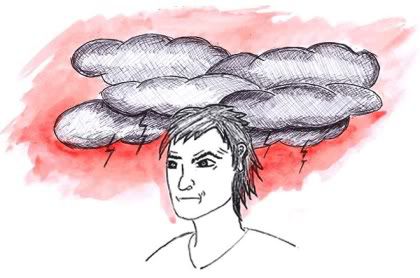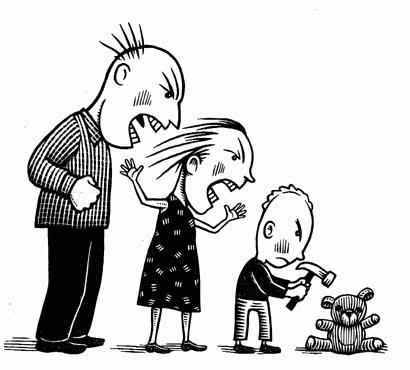Unlike most other feelings, the feeling of anger tends not to be a very socially acceptable and admitted to feeling. As a result, if, and when we do get angry, we then run the risk of being negatively judged by others.
Due to this social stigma, most people will try to suppress their anger. What they fail to realize, however, is that their anger was trying to communicate a very important message to them.
A message, which, if listened to, would allow them to not only respond more appropriately to their anger, but also, prevent that anger from accumulating inside of them.

So even though this emotion gets a bad rap, it’s important to understand that the feeling of anger is not what’s bad. Rather, it’s what you do with your anger that determines whether it becomes good or bad.
Causes of Anger
Since all of our emotions come from our perceptions (i.e., how we view something to be), we can better understand anger by looking at the two main perspectives that lead to it:
1) Current Beliefs

The first perspective consists of our beliefs about what we consider to be “right“, “wrong” and how things “should” be.
If things are right, or how they should be, then we feel that the situation is fair. But when things are wrong, or not as they should be, we automatically feel that the situation is unfair which then causes us to feel angry.
The intensity of anger that you experience will be directly proportional to your perception of the amount of injustice you think you have received. So the more unfairly you are treated, the more angry you are likely to become.
2) Your Mood

The second perspective is related to your current mood. If, for example, you put in a lot of time and effort into something, but don’t feel that you got the recognition or reward which you deserve, you are likely to feel tired and frustrated because nothing you do seems to be working.
This frustration may then cause you to think that what’s happening to you is “not right” and “not fair“, and because you are already in a bad mood, you are now much more likely to become angry as a result of this perceived injustice.
The Meaning & Messages of Anger
The message that anger communicates to us is one of fairness and of right and wrong. If you perceive something as being unfair to yourself, or to the people or things that you care about, then you will feel angry.
This anger is meant to motivate you, so that you can then take action to correct the injustice which you or your loved ones have been subjected to. The trouble with anger, is that because it’s such a powerful emotion within the body it can be very difficult to control.
So rather than being constructive, most of the time the anger that we experience becomes destructive both to ourselves and to those around us.

A good example of this can be found with crimes of passion, a term which describes a criminal act that was fuelled by a powerful emotion.
The large majority of these crimes are murders, murders which were fuelled by the emotions of jealously and anger in response to a perceived injustice. Although in this case, a more appropriate term for anger would be rage.
However, even though most people tend to associate anger with destructive consequences, it can also be used constructively. For example, there are many organizations that have been created as a result of anger at a perceived injustice.
One such organization is Mothers Against Drunk Driving (MADD), which was created after a mother’s child was killed by a drunk driver.
This organization now fights against drunk driving, and supports of the victims of this crime.

So as you can see from the above examples, the motivation that anger generates can be a powerful force in helping us to correct a perceived injustice.
What actions we take to correct this injustice, will then determine whether we have used our anger constructively or destructively.
Rigid thinking
Another message that anger reveals to us is the rigidity of our thinking. For if we have firmly fixed ideas about how people should act, or the way that things should be, then we are likely to become angry when things occur in a way that conflicts with those beliefs.
For example, if a child really wants to go out with their friends, but their parents won’t let them, then they are likely to become angry.
The more the child refuses to give up their position, the more anger they will experience from not being able to do what they want.

Should, however, this child be made to truly understand and accept why they are being kept at home, then their anger will soon pass because their beliefs about how things should be are no longer fixed, and therefore, are open to change.
What we learn from this simple example is that closed-minded people who refuse to accept that things might be different to how they think things are, always run the risk of experiencing lots of frustration and anger from the challenges that everyday living imposes on their firmly rooted beliefs.
This is one reason why it is so important to always have an open mind, listen to new ideas and be willing to modify your existing beliefs if necessary.
Fear
The final message that anger reveals to us, is of our fears. Whenever we feel angry at something because we perceive it as being unjust, our body reacts as though that injustice could also cause us harm.
The body does this through the release of “fight or flight” hormones, such as adrenaline, which cause you to feel pumped up and full of energy.

In this state of mind, an angry person could easily resort to violence, because essentially, their body has been prepared to fight and defend itself.
For example, if you have ever felt like hitting someone who made you really angry, then what you experienced was the fight or flight response. This is why anger so often leads to violence.

Be aware of this automatic response and recognize that in some cases, you may need to fight and defend yourself to protect your physical well-being.
But for the large majority of occasions, committing a violent act is only likely to cause you more problems and so should be avoided at all costs.
4 Steps to Manage Anger
Use the following guidelines to help you identify the feeling of anger and respond more appropriately to it.
Each step is designed to be carried out in order, and once you get the hang of it, you should find it quite easy to do the next time you are feeling angry about something.
1) Identify the Feeling

Sometimes when you become angry it just seems to sneak up on you, and before you know it, you are in a full-blown rage. So learn to identify this feeling as early as possible, because this will make it far easier to deal with.
2) Remember the Meaning

Anger tells you that what you are experiencing is unfair, could possibly harm you and that you should take action to make it right. This generates motivational energy, which you can then use to make things fair or safe in a constructive or destructive way.
3) Determine What’s Causing Your Anger

Anger comes as a result of something which goes against your expectations (how you thought things would be), your beliefs (how you think things should be) and your current mood (how you feel).
Ask yourself questions such as:
“Is my anger coming as a result of someone doing wrong against me or someone/something I care about?”
“Is my anger coming as a result of me being unwilling to change my mind about something?”
“Am I feeling angry because I have been in a bad mood all day?”
“Am I angry because I feel physically threatened?”
4) Do Something to Change the Way You Feel

Use the following three steps to determine how you should respond:
i) Is what you think about the situation correct? For example, is it really unfair?
ii) If the situation is unfair, find a way to make it fair. This is what your anger is trying to communicate to you.
iii) If you can’t make the situation fair, then practice forgiveness.
Analysis
By allowing yourself to think logically about something, you give yourself the opportunity to question the situation and determine whether or not you should really be feeling angry.
In some cases, you may discover that what you thought was happening was incorrect, and so will be able to neutralize your anger before it can progress any further.
This is an extremely important step, because the sooner you deal with your anger, the easier it will be to control.

If possible, allow yourself some time to cool down, as it is much harder to think logically when you are full of anger. A good way to do this is to immediately do something else to distract yourself from your current feeling.
Usually, you will find that once you have calmed down a bit, you will start thinking differently about the situation. By carrying out this step, you will also reduce the likelihood that you will do something which you later regret.
Get a different perspective
Calming down is easier said than done, and for some people, it can take quite a long time before they are able start to thinking clearly. In cases like this, it’s always a good idea to get someone else’s view on the situation, as their thinking will not have been clouded by anger.

Their view on the situation may then change how you view the situation, which could then help you to dispel your anger. You may for example, discover that the reason you were feeling angry was because you had a long day and were tired.
If anyone has ever been angry at you and then apologized shortly afterwards, then you know first hand how a change in perspective can affect someone’s anger.
Dealing With Unfair Situations
Unfortunately, not all situations are fair, and there will likely be times in your life when someone genuinely does something unjust or harmful towards you.
The anger that you experience as a result of this injustice, still holds the same message: do something to make the situation fair or right.

But at this point you have to be very careful about how you choose act, because as you saw with the crimes of passion which we discussed earlier, it’s far easier to respond to anger in a destructive way than it is in a constructive way.
Ultimately, how you choose to respond will be up to you, and dependent upon the situation you are in. But here are some ideas as to how you could appropriately respond when you find yourself in an unfair situation:
Make Your Feelings Known

Let the other person know that what they are doing is wrong, or harming you in some way. Sometimes, people don’t realize that they are making you angry and will stop when you tell them about it.
Tell Someone With Authority

Venting your anger out at someone usually has no effect on reversing the situation, and in most cases, will only make things worse.
If you are able to coherently express the reason for your anger to an authority figure, or someone else who has power to change the situation, the result of your anger is much more likely to be constructive than destructive.
Practicing Forgiveness
Sometimes there is nothing that you or anyone else can do to resolve the situation. For example, something may have happened to you in the past which you are angry about, but now, it is too late for you to do anything. In cases like this, the only way to resolve your anger is to practice forgiveness.

Some people may find it hard to forgive others for their past wrongs, because they feel that if they forgive them then they will then lose out in some way.
If you have difficulty in forgiving others, try to bear the following points in mind:
The Other Person Doesn’t “Win”

Understand that forgiving someone doesn’t necessarily mean the other person will benefit or be let off the hook.
You Don’t Have to Like Them
Forgiving someone doesn’t mean that you like that person, or like what they did. You can forgive someone without having to tell them that you have forgiven them.
You Don’t Have to Forget

When you forgive, it doesn’t mean that you have to forget what happened. Forgetting what happened may cause the same thing to happen to you again.
Storing Angry Feelings is Unhealthy

Emotions can be stored in the body and continually cause you stress. Anger is no different. Harboring anger or resentment towards others from your past is extremely unhealthy, and may contribute to diseases such as cancer and heart disease.
You Benefit
Think about it, does feeling angry about your past benefit you in any way? What’s the point of getting angry about something you can do nothing about?
By learning to forgive, you release the burden on your body and mind from the anger that you have been carrying around for so long. This not only improves your health, but will also improve how you feel about yourself and your life.

A person who is unable to forgive will be much more unhappy than someone who can forgive. By holding onto your anger, you allow that past person to negatively affect your present, which means that they will also affect your future.
Put these all together, and you can see how holding onto anger can result in a person negatively affecting your entire life. Is it worth it?
Think About What Happened

Sometimes it is easier to forgive by thinking about the contributing factors that caused your anger. So try thinking about the reasons why something happened the way it did. Is there anything that you could learn from that experience?
Summary
Despite what most people think, anger can be a very helpful feeling and should not be ignored. Use the powerful motivational energy that anger gives you to make your situation fair and right. But make sure that you do so in a constructive way.
Video
Reviewed – 23rd March 2016
